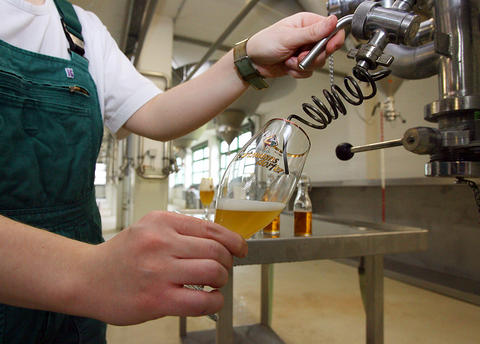Having tapped the local beer market for all it is worth, German brewers have begun making kosher beer for Jews and a halal, alcohol-free version for Muslims in a search for new clients.
In the land of Berliner Kindl, Beck's and Loewenbrau, the kosher version stands out with the name Simcha and a Star of David on its blue and gold label.
“The name means ‘joy' in Hebrew,” said Ludwig Hoernlein, a brewer in Hartmannsdorf in the east German state of Saxony, who is breaking into the Jewish market.

PHOTO: AFP
A certificate on the brewery wall, signed by Rabbi Yitshak Ehrenberg from Berlin, attests that the beer is produced in accordance with Judaic dietary rules but warns that it is not suitable for Passover.
“The whole production process is scrutinized from A to Z by a rabbi,” Hoernlein said.
He explained that Simcha, a white pilsner with its alcohol content of 4.9 percent, may not come into contact with a drop of beer produced the traditional German way.
A 30-tonne silo at the brewery is reserved exclusively for kosher grains.
The barley and hops are grown organically in Bavaria, the yeast used to ferment it is made at the brewery and the water comes from local springs.
In accordance with Jewish food rules, the barley may not have been grown during the Passover period and pregnant or menstruating women may not be involved in the production.
The brewery's stainless steel pipes have to be cleaned before the Simcha streams through them and the beer is bottled well apart from the others produced here.
The kosher certification comes at a high cost — Simcha is roughly 80 percent more expensive than the average German beer.
The brew was launched six months ago and Hoernlein said though demand has been strong, it is too soon to speak of a hit.
“We are still in the experimental stage.”
The first 100,000 liters were sold mainly to Jewish communities and kosher restaurants in Germany but Hartmannsdorf, a tiny brewery by German standards, has also received orders from Vienna, Belgium and Britain.
“We are also actively involved in negotiations in Israel with import-export people and a hotel chain there,” Hoernlein said proudly.
He said the beer is the cross-cultural brainchild of Jewish brothers by the name of Dziuballa who run a kosher restaurant in east German city of Chemnitz and Wilfried Gotter, a friend who runs an evangelical bookshop.
“It proves that beer brings people together,” Hoernlein said.
An even more ambitious project of making granules for just-add-water, alcohol-free beer for the Muslim market has its home in Freising in Bavaria.
It is made by GranMalt, a company founded just last year, and sells to soft-drink producers abroad who mix it with water and milk for their Muslim clients.
“Because of the saturation of the German market, we have begun making instant alcohol-free beer and selling it to exporters who serve mainly the Middle East,” said GranMalt director Claus Kuester.
“Since their religion forbids alcohol, Arab countries have hardly any breweries so we have decided to move in to fill the gap.”
GranMalt opted for granules because these are easier to export and less likely to spoil on the export voyage than a bottled beverage.
Drying the malt without losing the flavor and destabilizing the ingredients that produce beer's head of foam proved a challenge, but Kuester said a special evaporation process has done the trick.
The Muslim market is yet to deliver its verdict, but in the meantime the project has won Germany's Entrepreneur Prize.

June 2 to June 8 Taiwan’s woodcutters believe that if they see even one speck of red in their cooked rice, no matter how small, an accident is going to happen. Peng Chin-tian (彭錦田) swears that this has proven to be true at every stop during his decades-long career in the logging industry. Along with mining, timber harvesting was once considered the most dangerous profession in Taiwan. Not only were mishaps common during all stages of processing, it was difficult to transport the injured to get medical treatment. Many died during the arduous journey. Peng recounts some of his accidents in

“Why does Taiwan identity decline?”a group of researchers lead by University of Nevada political scientist Austin Wang (王宏恩) asked in a recent paper. After all, it is not difficult to explain the rise in Taiwanese identity after the early 1990s. But no model predicted its decline during the 2016-2018 period, they say. After testing various alternative explanations, Wang et al argue that the fall-off in Taiwanese identity during that period is related to voter hedging based on the performance of the Democratic Progressive Party (DPP). Since the DPP is perceived as the guardian of Taiwan identity, when it performs well,

The Taiwan People’s Party (TPP) on May 18 held a rally in Taichung to mark the anniversary of President William Lai’s (賴清德) inauguration on May 20. The title of the rally could be loosely translated to “May 18 recall fraudulent goods” (518退貨ㄌㄨㄚˋ!). Unlike in English, where the terms are the same, “recall” (退貨) in this context refers to product recalls due to damaged, defective or fraudulent merchandise, not the political recalls (罷免) currently dominating the headlines. I attended the rally to determine if the impression was correct that the TPP under party Chairman Huang Kuo-Chang (黃國昌) had little of a

At Computex 2025, Nvidia CEO Jensen Huang (黃仁勳) urged the government to subsidize AI. “All schools in Taiwan must integrate AI into their curricula,” he declared. A few months earlier, he said, “If I were a student today, I’d immediately start using tools like ChatGPT, Gemini Pro and Grok to learn, write and accelerate my thinking.” Huang sees the AI-bullet train leaving the station. And as one of its drivers, he’s worried about youth not getting on board — bad for their careers, and bad for his workforce. As a semiconductor supply-chain powerhouse and AI hub wannabe, Taiwan is seeing